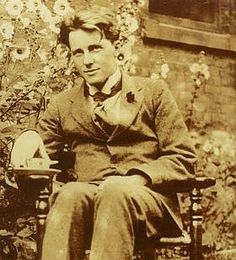
As per our current Database, Rupert Brooke has been died on 23 April 1915(1915-04-23) (aged 27)\nSkyros, Greece.
When Rupert Brooke die, Rupert Brooke was 27 years old.
| Popular As | Rupert Brooke |
| Occupation | Writers |
| Age | 27 years old |
| Zodiac Sign | Virgo |
| Born | August 03, 1887 (Rugby, British) |
| Birthday | August 03 |
| Town/City | Rugby, British |
| Nationality | British |
Rupert Brooke’s zodiac sign is Virgo. According to astrologers, Virgos are always paying attention to the smallest details and their deep sense of humanity makes them one of the most careful signs of the zodiac. Their methodical approach to life ensures that nothing is left to chance, and although they are often tender, their heart might be closed for the outer world. This is a sign often misunderstood, not because they lack the ability to express, but because they won’t accept their feelings as valid, true, or even relevant when opposed to reason. The symbolism behind the name speaks well of their nature, born with a feeling they are experiencing everything for the first time.
Rupert Brooke was born in the Year of the Pig. Those born under the Chinese Zodiac sign of the Pig are extremely nice, good-mannered and tasteful. They’re perfectionists who enjoy finer things but are not perceived as snobs. They enjoy helping others and are good companions until someone close crosses them, then look out! They’re intelligent, always seeking more knowledge, and exclusive. Compatible with Rabbit or Goat.










I sat with Rupert. At 4 o’clock he became weaker, and at 4.46 he died, with the sun shining all round his cabin, and the cool sea-breeze blowing through the door and the shaded windows. No one could have wished for a quieter or a calmer end than in that lovely bay, shielded by the mountains and fragrant with sage and thyme.
Brooke was born at 5 Hillmorton Road, Rugby, Warwickshire, the second of the three sons of William Parker Brooke, a schoolmaster (teacher) at one of England's most prestigious schools, Rugby, and his wife Ruth Mary Brooke, née Cotterill. He attended preparatory (prep) school locally at Hillbrow, and then went on to Rugby itself. In 1905, he became friends with St. John Lucas, who thereafter became something of a mentor to him.
Brooke suffered a severe emotional crisis in 1912, caused by sexual confusion (he was bisexual) and jealousy, resulting in the breakdown of his long relationship with Ka Cox (Katherine Laird Cox). Brooke's paranoia that Lytton Strachey had schemed to destroy his relationship with Cox by encouraging her to see Henry Lamb precipitated his break with his Bloomsbury group friends and played a part in his nervous collapse and subsequent rehabilitation trips to Germany.
Brooke's accomplished poetry gained many enthusiasts and followers, and he was taken up by Edward Marsh, who brought him to the attention of Winston Churchill, then First Lord of the Admiralty. Brooke was commissioned into the Royal Naval Volunteer Reserve as a temporary Sub-Lieutenant shortly after his 27th birthday and took part in the Royal Naval Division's Antwerp expedition in October 1914.
Brooke's surviving brother, 2nd Lt. william Alfred Cotterill Brooke, was a member of the 8th Battalion London Regiment (Post Office Rifles) and was killed in action near Le Rutoire Farm on 14 June 1915 aged 24. He is buried in Fosse 7 Military Cemetery (Quality Street), Mazingarbe, Pas de Calais, France. He had only joined the battalion on 25 May.
His grave remains there still, with monument erected by his friend Stanley Casson, poet and archaeologist, who in 1921 published Rupert Brooke and Skyros, a "quiet essay", illustrated with woodcuts by Phyllis Gardner Another friend and war poet, Patrick Shaw-Stewart, assisted at his hurried funeral.
On 11 November 1985, Brooke was among 16 First World War poets commemorated on a slate monument unveiled in Poets' Corner in Westminster Abbey. The inscription on the stone was written by a fellow war poet, Wilfred Owen. It reads: "My subject is War, and the pity of War. The Poetry is in the pity."
The wooden cross that marked Brooke's grave on Skyros, which was painted and carved with his name, was removed when a permanent memorial was made there. His mother, Mary Ruth Brooke, had the cross brought to Rugby, to the family plot at Clifton Road Cemetery. Because of erosion in the open air, it was removed from the cemetery in 2008, and replaced by a more permanent marker. The Skyros cross is now at Rugby School with the memorials of other old Rugbeians.
American adventurer Richard Halliburton made preparations towards writing a biography of Brooke, meeting his mother and others who had known the poet, and corresponding widely and collecting copious notes, but he too died young, the manuscript unwritten. Halliburton's notes were used by Arthur Springer to write Red Wine of Youth—A Biography of Rupert Brooke (New York: Bobbs-Merrill, 1952).










